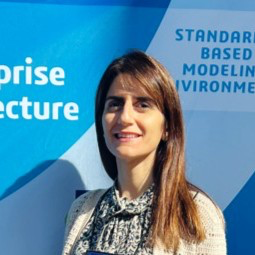Digital Engineering Graduate Certificate
University of Massachusetts Lowell
A one-year program that includes four courses designed to build skills in
Systems-Thinking, Model-Based Systems Engineering Methodologies and Enterprise Architectures
Project based learning with applications drawn from control systems, sensors, embedded systems, cyber-physical systems, data-driven decision making and risk management.
Students will develop MBSE models on the CATIA platform using the Systems Modeling Language (SysML) and conduct analysis and simulation studies using MATLAB and Simulink.
Each course is 8-weeks in duration. EECE 5492 and EECE 5494 are offered in the first and second sessions of the Spring 2026 semester. EECE 5496 and EECE 5498 are offered in the following Fall 2026 semester.
Interested in Applying? Click here to submit your name and contact on the GPS site !
If you want to take one of these courses for degree or non-degree credit
please email: kavitha_chandra@uml.edu
Vision
Our vision of Digital Engineering program addresses building systems thinking and modeling skills for students to be ready to work in organizations transforming to digital and AI augmented practices. We engage experts developing platforms for digital engineering and practitioners from industry with years of systems modeling experience as instructors.
Our modular approach to Digital Engineering Education delivers the following:

Course Descriptions
EECE. 5492 Systems, Modeling and Simulation for Digital Engineering
Introductory course provides a high-level view of systems thinking, systems engineering, physical system modeling, and model-based systems engineering (MBSE). System dynamics will be simulated using MATLAB/Simulink. Students will learn to model requirements, structure, behavior and parametrics using the systems modeling language (SysML).
EECE. 5494 Model-Based Systems Engineering
The second course will focus on extending understanding and practice in model-based representation of engineered systems. SysML and MBSE will be used as a primary tool to practice systems thinking. Stakeholder requirements, use-cases, system contexts, problem domain modeling, solution architectures will be explored using MBSE, Object-Oriented Systems Engineering (OOSEM), and MagicGrid methods.
EECE. 5496 Cyber-Physical Systems Modeling and Simulation
The focus of the third course is to analyze physical systems and their interactions with embedded digital sub-systems and communication networks with examples from cyber-physical systems (CPS). Continuous and discrete time systems, system control, and state estimation models are presented. The specification of functional, behavioral, and security requirements for CPS using MBSE and Unified Architecture Framework (UAF) is undertaken.
EECE. 5498 Data-Driven Models. Decision Making and Risk Management
The fourth course in the certificate addresses methodologies for making decisions and managing risk using various types of system related data. Uncertainty and randomness in the system will be addressed using probabilistic methods such as Bayesian networks, Markov Chains, Hidden-Markov Models, Markov Decision Processes and Monte-Carlo methods. System augmentation using Artificial intelligent (AI) and Machine learning (ML) algorithms will be introduced.












